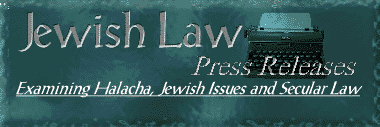

Press Releases
April 17, 1997
LANDMARK RELIGIOUS-SCHOOL RULING BEFORE SUPREME COURT
Agudath Israel "Hopeful" As Procedural, Constitutional Issues Considered
A landmark 1985 U.S. Supreme Court decision barring public school teachers from entering religious schools to teach federally financed remedial classes may be on its way to being reconsidered, and likely reversed, by the High Court.
On April 15, the Justices heard oral arguments on both the propriety of the procedure being used to reopen the 1985 case, Aguilar v. Felton, and the constitutionality of on-site remedial classes at religious schools.
In its 1985 decision, the High Court ruled that the New York City Board of Education's program of sending public school teachers into religious schools to provide federally-funded remedial education services to economically disadvantaged, low-achieving students violated the constitutional separation of church and state.
The 1985 ruling prompted school districts around the country to adopt unwieldy and expensive alternative means of carrying out their statutory obligation to provide remedial education to eligible nonpublic school children. These alternate service delivery mechanisms included sending nonpublic school children to public schools and other "neutral sites" to receive their remedial services; sending public school teachers to leased trailers/vans parked near religious schools and having eligible students receive their remediation in these "mobile instructional units"; providing remedial instruction through computers rather than teachers.
The net effect of all these changes has been, by all accounts, disastrous. The number of nonpublic school students receiving teacher-administered remedial services has gone down. The quality of instruction has suffered. And the expense of implementing the alternate service delivery mechanisms has been staggering.
For these reasons, the New York City Board of Education is seeking to reopen the 1985 case. It is being backed in its quest by the New York State Education Department and the Clinton Administration.
Presently, the Court must decide whether Rule 60b of the Federal Rules of Civil Procedure, which allows the reopening of a case in light of new circumstances, can be used to reopen the 1985 case. New York City is citing the fact that five Justices have criticized the 1985 decision -- and indicated their willingness to reverse it -- as justifying the revisiting of Aguilar.
Among those present as the High Court heard arguments from Paul A. Crotty, New York City's corporation counsel and United States Solicitor General Walter Dellinger -- who presented the federal government's interest in revisiting the earlier case -- was Agudath Israel of America's associate general counsel Morton Avigdor. Agudath Israel has long advocated the constitutionality of sending teachers into nonpublic -- including religious --schools to teach federally financed remedial classes, working with the New York City Board of Education, testifying before the U.S. Congress, and participating in an amicus curiae ("friend of the court") presentation to the Supreme Court.
Mr. Avigdor cites the terrible impact the Aguilar ruling has had on nonpublic school education and on strained education budgets. "New York City," he notes, "has spent more than $100 million since the Aguilar ruling for trailers and vans alone." "Just imagine," he adds, "the costs of that decision on a national scale."
Said David Zwiebel, director of government affairs and general counsel for Agudath Israel:
"It's not often that the Supreme Court reverses itself, but the Court is obviously well aware of the enormous problems its 1985 ruling has created. These have been 12 long years, but at long last there is reason to be hopeful that the demise of the Aguilar precedent may finally be at hand."
Copyright © 1997-2008 by Ira Kasdan. All rights reserved.
DISCLAIMER